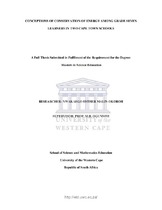| dc.contributor.advisor | Ogunniyi, M.B. | |
| dc.contributor.author | Okoroh, Nwakaego Esther Malin | |
| dc.date.accessioned | 2021-03-25T10:50:31Z | |
| dc.date.available | 2021-03-25T10:50:31Z | |
| dc.date.issued | 2021 | |
| dc.identifier.uri | http://hdl.handle.net/11394/8047 | |
| dc.description | Magister Educationis - MEd | en_US |
| dc.description.abstract | The clamour in the country about the poor performance of learners in the area of physical science is a concern and this problem had been attributed to different facets of learning which include the amendment of curriculum over the years. But my question is; can the curriculum amendment succeed without effective teaching approaches? This poignant question formed the central concern for this investigation. This study examined two cohorts of grade seven learners’ conceptions of conservation of energy using a Dialogical Argumentation Instructional Model (DAIM) as well as the Traditional Lecture Method (TLM). The study involved 48 learners selected from two public schools in Cape Town. Using a quasi-experimental (Non-equivalent groups) design, the study examined the two groups from different schools (24 learners in each). It exposed one group to the Traditional Lecture Method (TLM) and the other group to a Dialogical Argumentation Instructional Model (DAIM) which was based on two argumentation frameworks– Toulmin’s Argumentation Pattern (TAP) and Contiguity Argumentation Theory (CAT). | en_US |
| dc.language.iso | en | en_US |
| dc.publisher | University of Western Cape | en_US |
| dc.subject | Argumentation | en_US |
| dc.subject | Collaborative learning | en_US |
| dc.subject | Dialogical argumentation instructional model | en_US |
| dc.subject | Toulmin’s argumentation pattern | en_US |
| dc.subject | Contiguity argumentation theory | en_US |
| dc.title | Conceptions of conservation of energy among grade seven learners in two cape town schools | en_US |
| dc.rights.holder | University of Western Cape | en_US |

